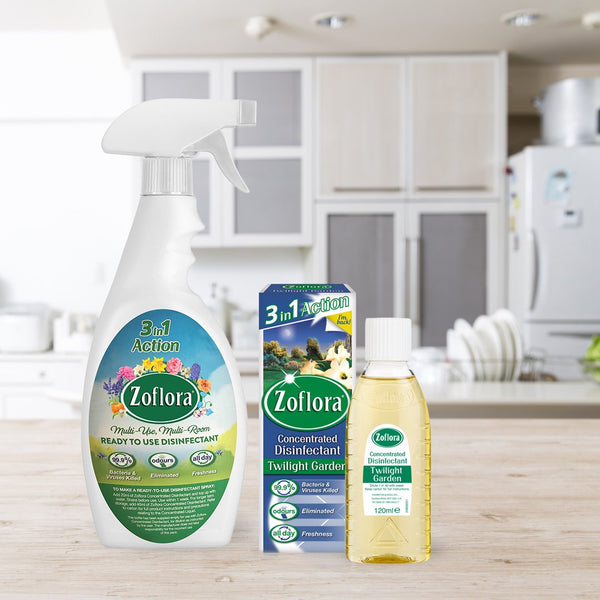Your Cart is Empty
Zoflora protects your home & workspace from Coronavirus!
Zoflora has been laboratory tested and proven to kill coronaviruses, including the COVID-19 virus (SARS-CoV-2), and conforms to the latest British standard BS EN14476:2013+A2:2019 relating to the virucidal activity of chemical disinfectants, when used at 1:40 dilution with a 5 minute contact time.
Effective against a variety of bacteria & viruses within a 5 minute contact time.
THE FACTS ARE IN. LEARN MORE HERE.
Zoflora protects your home & workspace from Coronavirus!
Zoflora has been laboratory tested and proven to kill coronaviruses, including the COVID-19 virus (SARS-CoV-2), and conforms to the latest British standard BS EN14476:2013+A2:2019 relating to the virucidal activity of chemical disinfectants, when used at 1:40 dilution with a 5 minute contact time.
Effective against a variety of bacteria & viruses within a 5 minute contact time.
THE FACTS ARE IN. LEARN MORE HERE.
SAFE FOR THE WHOLE FAMILY
When you use Zoflora as part of your daily routine, you can relax knowing your family are protected. Our multi-purpose concentrated disinfectant can be used throughout the home to combat the spread of bacteria and viruses.
VIEW ALL PRODUCTS
SAFE FOR THE PETS WE LOVE
We know that your faithful furry friends are an important part of the family and that keeping them safe and happy is a top priority.
Zoflora kills 99.9% of Bacteria and Viruses, including those which can cause animal illnesses.
PET & HOME SAFETY
SAFE FOR THE WHOLE FAMILY
When you use Zoflora as part of your daily routine, you can relax knowing your family are protected. Our multi-purpose concentrated disinfectant can be used throughout the home to combat the spread of bacteria and viruses.
VIEW ALL PRODUCTS
SAFE FOR THE PETS WE LOVE
We know that your faithful furry friends are an important part of the family and that keeping them safe and happy is a top priority.
Zoflora kills 99.9% of Bacteria and Viruses, including those which can cause animal illnesses.
PET & HOME SAFETY
October 01, 2021 3 min read
We’ve waited for the cold to leave and now that it’s gone are we really out of the woods? While winter may have left, there’s no bigger welcome than the allergy season symptoms that spring brings. In addition to flower buds and blooming trees, springtime brings sneezing, congestion, runny noses, and other bothersome symptoms to the millions of people who suffer from allergy season symptoms. Allergic rhinitis and hay fever - also known as seasonal allergies - can make you miserable. But before it gets you down, let us help!
An uncomfortable side effect of a long, hot summer approaching is that these irritants remain suspended in the air for longer. This means that the irritants or particles enter the mouth or nose where they settle on the delicate mucosa of the upper airways. By the time these particles land on the membranes that line the airways, the allergen has diffused into them, triggering an allergic reaction. Not good at all! Dry conditions could lead to an extended pollen season, which could worsen symptoms. Hay fever season starts when trees pollinate in August and lasts until October. In the meantime, grass pollen takes over, peaking between November and March. Don’t let seasonal allergies get you down, try out these tips for a more comfortable spring.

Reduce exposure to things that trigger your allergy symptoms (allergens):
Allergy season symptoms are aggravated when there is a lot of pollen in the air:
Allergy symptoms can be relieved with several non-prescription medications:
Using a saline solution to rinse your nasal passages is a quick, affordable and effective way to relieve nasal congestion. Using a nasal rinse directly flushes mucus and allergens away.
You can find a neti-pot or squeeze bottle at a health food store or pharmacy. You should use distilled, sterile, boiled, cooled, or filtered water for your saline wash solution. Make sure to rinse the irrigation device after every use.
If you’re looking to travel and want to enjoy an allergy-free or peaceful trip, use these tips to stay ahead of these allergy season symptoms.

Stay ahead of allergy season symptoms for the rest of the year and keep your home and space clean and fresh with Zoflora. If you’re longing to be outdoors to smell the blooms and freshness of spring and summer but can’t manage, Zoflora can give you all of this without the irritants. While you may not be able to control much of your symptoms or the air, you can control and maintain the clean air in your home. Keep your home and space clean, germ-free, and still have a taste of spring with all of Zoflora’s beautiful scents. Get yours today!
Comments will be approved before showing up.

We promise to only send you relevant news and info regarding our special offers, we do not spam or share your info.
